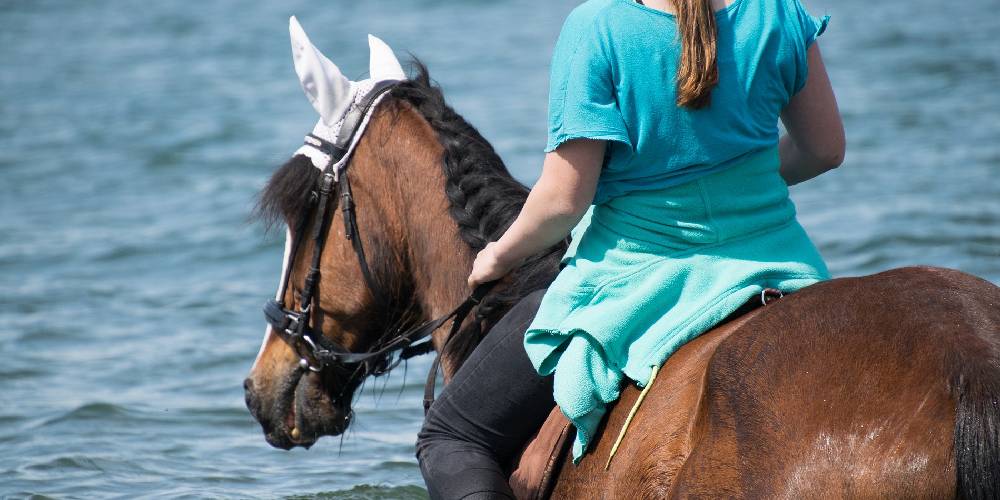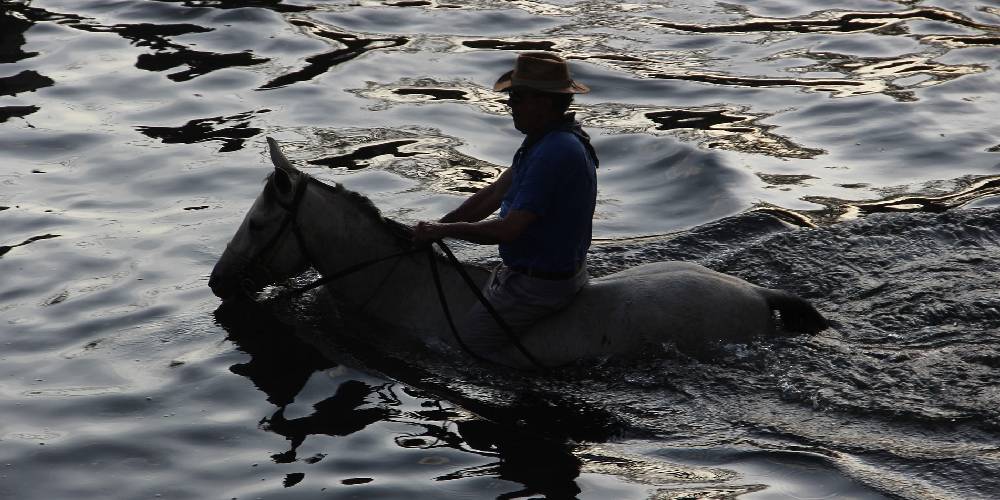I was trail riding with my boyfriend with the plan to ride my horses to a lake. When we got to the trail heading towards the lake, we saw that horses were not allowed to enter. Curious, we asked a few people on the trail if they knew why horses weren’t allowed at the lake and we soon found out that it was a drowning incident that now keeps horses out of the lake. Knowing that horses are fairly strong swimmers, I was curious as to how and why this poor animal drowned, so I decided to learn more about the breathing of horses and the potential cause of this animal’s drowning.
Why Do Horses Drown So Easily?
Horses drown easily because they can only breathe through their noses. This means that if they accidentally inhale water, they can’t cough it back up and it goes straight into their lungs. It doesn’t take much water to drown a horse, so drowning is not a very uncommon incident. Horses can drown in as little as three inches of water, so staying cautious of your horse around large amounts of water such as lakes, rivers, ponds, creeks, canals, etc. is important.
How Long Does It Take For A Horse To Drown?
It can take only a matter of seconds for a horse to drown and this is due to not only their inability to cough up any inhaled water but also the horse’s inability to hold its breath. This means that if a horse goes underwater, they will continue to breathe normally as if they were above water as they can’t stop their breathing. This causes the horse’s lungs to fill with water and the horse to drown.
Can Horses Swim Safely?

Just because horses drown easily doesn’t mean that they can’t swim. Horses are natural swimmers and some horse facilities and veterinary clinics have equine pools specifically made for the swimming of horses.
Though horses are able to swim safely, all it takes is the horse to get its head under water for a few seconds and it’s game over. A horse drowned in an equine pool just a few minutes down the road from where I live when it got its head under the water during a swimming exercise session.
Will Horses Drown If They Swim While Carrying A Rider?
Horses are not at risk of drowning when carrying a rider. The only reason a horse might drown while carrying a rider is if the rider is restricting or getting in the way of the horse’s legs, preventing the horse from continuing to swim.
With this being said, your horse shouldn’t have any problems carrying you when swimming, just remember to not keep your horse swimming too long, not to restrict your horse’s movement in anyway, and to make sure your horse keeps its head above water at all times.
What Is The Lung Capacity Of A Horse? How Does This Relate To Drowning?
The lungs of a horse are absolutely gigantic and have the capacity to contain 55 liters of air! A horse, when resting, takes only 5 liter breaths so this air intake is easily managed and contained by the horse’s huge lungs.
A reason a horse can drown so easily, especially when swimming, is that they can take in an insane amount of water in just a breath or two when their face is underwater. Swimming is a difficult and tiring activity for a horse to do, so usually, they are breathing hard when swimming. If the horse takes in 5 liters of air when resting, it can take in much more when it is exercising, therefore increasing the amount of water that could potentially make it into the horse’s lungs.
What Natural Traits & Abilities Do Horses Have That Make Them Better Swimmers & Prevent Drowning?

There are a few things that horses have been born with to help them in swimming to prevent drowning at all costs. These include:
Natural Buoyancy
Horses actually float naturally really well making it easier for them to keep their heads above water as compared to if they couldn’t really float at all. The ability to float can be credited to the horse’s huge lungs that almost act as an internal flotation device for horses.
Knowing How To Swim From Birth
Most breeds of horses are born with the ability or at least the idea of how to swim. This helps greatly so the horse can get around in water if they need to. The ability to swim is almost a defense and survival mechanism that the horses can use to migrate and escape from predators or other dangers.
Is It Difficult To Desensitize A Horse To Water?
The answer to this question can be a yes or a no! There are plenty of ways to desensitize your horse to the point where they will willingly and happily entering and exiting the water without a hiccup.
The best way to start desensitizing your horse to water is by starting shallow before moving to a deeper option. An example of this would be like start by walking your horse through puddles before graduating them to walking through creeks or lakes. Some horses don’t like to get wet at all so using a hose or buckets and dousing your horse with water so they get used to being wet can help the process as well.
Some barns and facilities have equine therapy pools that horses can use to get exercise through swimming. This is a good place to work on your horse’s fear of water and a place where you may eventually be able to exercise them.
Summary
Horses are great swimmers, just make sure that you are not limiting the horse’s movement when you are riding them while they swim. Horses can drown extremely easily by inhaling water through their noses so taking extra measures of caution is recommended. Horses have an enormous lung capacity so keeping their head above water is crucial. The reason their head must be above water at all times is so they don’t accidentally begin to inhale water, filling their lungs with liquid.

